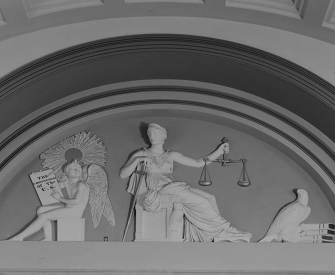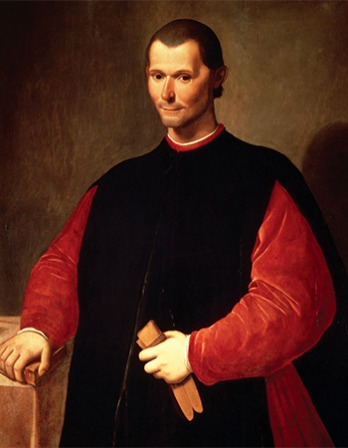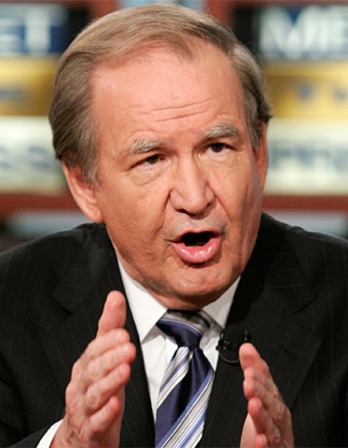Wallace
The judge advocate may continue—
Baker
[losing control of himself for the first time] The judge advocate may continue? Defense counsel is amazed that the Court does not now recognize there is no legal case here. To attempt to connect normal obedience to orders with willful conspiracy is impossible and no fine sounding statement about universal law or supreme tribunal can bridge the unbridgeable. The Court knows the judge advocate cannot possibly make that connection. The Court knows that! And yet the Court allows the judge advocate to proceed when it should forthwith dismiss the defendant—
Wallace
Is counsel ordering the Court to do that?
Baker
No, but he submits there is no legal case here.
Wallace
The judge advocate may continue—[sharply, as Chipman takes a step toward Wirz] bearing in mind that the Court may conclude at any time that it feels there is nothing more to be gained from this line of questioning.
Chipman
[crosses slowly to Wirz, tired] Mr. Wirz, we have said that a man does make some inner judgment as to the orders he obeys. That implies that if those orders offend his humanity deeply enough he may disobey them. The authority of General Winder over you was not absolute. And so the question is, why did you obey?
Wirz
[looking about him rapidly] Am I required to answer?.... I did not think of my assignment at Andersonville in that way…. I do not understand what happens here…. I thought only in the normal way to obey him, since he was my military superior—
Chipman
But not your moral superior, Mr. Wirz. No man has authority over the soul of another. As we are men we own our own souls and as we own them, we are equal as men—the general, the private, the professor, the hod carrier. We are equal as men, sir. And every man alive, as he is a man, knows that—as you in your heart knew that—
Wirz
But that is not—
Chipman
And as that situation had become a grossly immoral situation, and as General Winder was not your moral superior, you did not have to obey him. So the question remains, why did you obey?
[Wirz glances toward Wallace.]
Wallace
The Court will hear the answer.
Wirz
[incredulously] I will say it clearly. I would have been most certainly court-martialed. And if my superiors wished, considering it was a time of war, and that the war had come to a desperate, bitter stage in which the word “traitor” could be sounded in a moment—I might have been executed—
Chipman
It might at least have been for a reason. You might have saved fourteen thousand lives—were you afraid?
Wirz
I? A soldier? Afraid?
Chipman
[standing over Wirz] The question then still is—Why did you obey?
Wirz
As I have explained. What heroic thing do you demand I should have done at Andersonville? I—an ordinary man like most men?
Chipman
Mr. Wirz, we who are born into the human race are elected to an extraordinary role in the scheme of things. We are endowed with reason and therefore with personal responsibility for our acts. A man may give to officials over him many things. But not what is called his soul, sir—not his immortal soul. And the question therefore still is—Why did you obey?
Wirz
Why? As I have said. As I say for the last time—it was to me a military situation.
Chipman
But that was not a military situation, Mr. Wirz. Those helpless, unarmed men were no longer the enemy, whatever Winder said. Here was no longer a question of North and South; no longer a question of war; only a question of human beings. Chandler saw that. Those Southern women who brought food for those starving men—they saw that. Where was your conscience then?
Wirz
Where!?
Chipman
In General Winder’s pocket with his keys, his tobacco, and his money. And worth no more than any of those things—
Wirz
You speak high, Colonel—high! Ask them in this room if they can say in their hearts they would have done different if they had been in my place—ask them. [in fury and contempt] You are all the victors here, and you make up a morality for the losers!
Chipman
Yes! The victor makes the morality since the loser cannot.
Wirz
And I spit on that morality! I spit on it! And I say—ask them in this room if they would have done different—ask them—
Chipman
And if they could not, then we must shudder for the world we live in—to think what may happen when one man owns the conscience of many men. For the prospect before us is then a world of Andersonvilles—of jailers concerned only to execute the commands of their masters. And freed of his conscience—fearing only the authority to which he had surrendered his soul—might the jailer not commit murder then?
From The Andersonville Trial. Levitt planned to become an engineer until H.L. Mencken convinced him to pursue writing, with the assurance that, “You will make just as little money.” In the thirties he joined the Federal Writers Project, President Franklin D. Roosevelt’s program that supported writers during the Great Depression. His play opened on Broadway in December 1959; he was awarded an Emmy in 1971 when it was adapted for television.
Back to Issue




